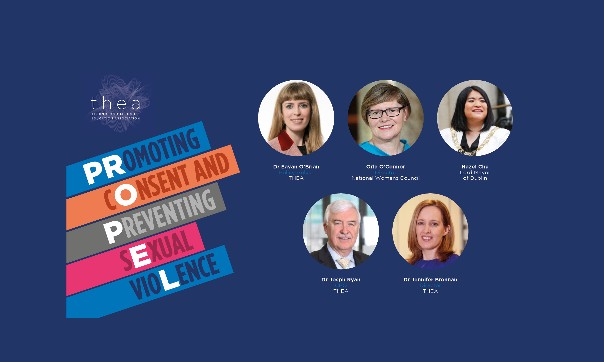Further funding for resources at national and institutional level in order to meet the challenges of sexual violence and harassment in higher education institutions has been recomended by the Technological Higher Education Association (THEA) in its PROPEL Report (Promoting Consent and Preventing Sexual Violence).
THEA PROPEL Project Report
The report is the culmination of a body of work undertaken by THEA in order to assist technological higher education institutions to implement the national Framework for Consent in Higher Education Institutions: Safe, Respectful, Supportive and Positive – Ending Sexual Violence and Harassment in Irish Higher Education Institutions, published in April 2019.
This in-depth THEA PROPEL Project Report represents a significant body of research into the national and international context, which involved an extensive consultation process including representation from:
– Survivors’ groups: Rape Crisis Centres (particularly the Dublin Rape Crisis Centre), National Women’s Council, 1752 Group
– Unions: USI, TUI, Fórsa, SIPTU, Unite
– Traditional universities, incl. Maynooth University, NUIG, UCC, and UCD
– Higher Education Authority
– Department of Further and Higher Education, Research, Innovation, and Science
The report details key components and options for inclusion in institutional action plans, outline of best practice and guidelines for emerging policies and procedures in this area and a series of conclusions and recommendations.
The THEA PROPEL Project Report calls for significant further funding to be made available in the area of sexual misconduct management, both at a national level and institutional level. It recommends the creation of new posts such as a ‘sexual misconduct prevention and response manager’ in institutions, to be supported at a national level by a sectoral representative and a panel of trained investigators.
There is also a call for increased collaboration among higher education institutions in this area in order to tackle what is essentially a societal problem and the introduction of sector-wide guidance, identifiers and categories of misconduct offenses and appropriate sanctions across institutions. The success of the THEA project is partly due to the collaborative and cooperative nature of all technological higher education institutions working together to achieve a level of consistency in the implementation of the National Framework. This collaboration and cooperation could be extended further through creation of national resources to facilitate further collaboration.
Training for staff and students is identified as a key priority for institutions, along with increased visibility of supports, services, and communications in this area across institutions.
Speaking at the launch, Policy Analyst and author of the report, Dr Eavan O’Brien, THEA stated: “It is important to acknowledge that our understanding of the problems of sexual violence and harassment in higher education is still developing, and the best means of preventing and responding to these issues are consequently also in evolution. Rather than the end, this report is just the beginning. Sexual violence and harassment are generally related to power. We must examine structural inequities that are the drivers of unacceptable behaviour and that set the conditions for abuse of power. This includes challenging and dismantling sexism, racism, ableism, and discrimination based on gender identity, expression, and sexual orientation. We must also recognise, as a society, that we will be more successful in eradicating these behaviours if we educate and raise awareness of sexual consent at primary and post-primary levels.”
Dr Joseph Ryan, CEO, THEA said: “This carefully researched report has been of immense assistance to our institutions in developing institutional action plans to tackle sexual harassment across the higher education sector. These action plans will be formally submitted to the Minister for Further and Higher Education, Research, Innovation and Science over the coming weeks. Higher education institutions are in a unique position to influence a significant proportion of the country’s younger population and the collaborative nature of this project has displayed a willingness to work together to assist in all aspects of the implementation.”
Orla O’Connor, Director of the national Women’s Council of Ireland said: “Institutions cannot end sexual harassment and violence in isolation – they need to work in close collaboration. The National Advisory Committee, led by the National Women’s Council, is but one example of how this can be achieved, and the PROPEL project is another. We were delighted to support THEA and its member institutions in their undertaking of the PROPEL project. We all know that sexual violence and harassment is not confined to higher education but, instead, affects every part of society. However, we also know and recognise that higher education institutions are uniquely placed to address this harmful behaviour.”
Lord Mayor of Dublin, Hazel Chu said: “I commend THEA and its member organisations on publishing this important report. This will significantly assist all higher education institutions in preventing and responding to sexual violence and harassment. I particularly appreciate the recommendation that, in such work, institutions must seek to be inclusive, particularly towards students and staff who may be especially vulnerable to sexual violence and harassment. I also recognise the fact that sexual harassment and sexual violence are societal problems that require an ‘all of society’ approach. To that end, we need to look closely at how ‘consent’ is talked about with younger people, from childhood onwards. It is never too early to learn about respect.”
Access to institutional and national data on instances of sexual harassment and violence must underpin action planning and implementation of the National Framework. THEA will support the data gathering initiatives to be undertaken by the Higher Education Authority and assist in the national communications campaign to highlight awareness of and the importance of consent.












Comments